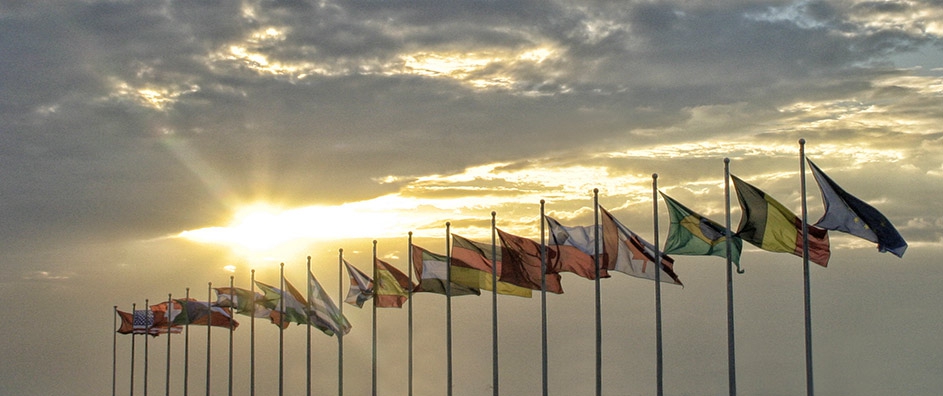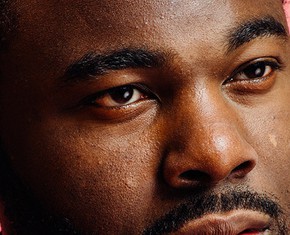The views expressed in our content reflect individual perspectives and do not represent the authoritative views of the Baha'i Faith.
The Baha’i Faith brings not only a new spirituality and a new religion to humanity—it also brings a new way of governing ourselves internationally.
Abdu’l-Baha described, in detail, the formation and the functions of that global governing body heralded by Baha’u’llah:
True civilization will unfurl its banner in the midmost heart of the world whenever a certain number of its distinguished and high-minded sovereigns—the shining exemplars of devotion and determination—shall, for the good and happiness of all mankind, arise, with firm resolve and clear vision, to establish the Cause of Universal Peace. They must make the Cause of Peace the object of general consultation, and seek by every means in their power to establish a Union of the nations of the world. They must conclude a binding treaty and establish a covenant, the provisions of which shall be sound, inviolable and definite. They must proclaim it to all the world and obtain for it the sanction of all the human race. This supreme and noble undertaking—the real source of the peace and well-being of all the world—should be regarded as sacred by all that dwell on earth. All the forces of humanity must be mobilized to ensure the stability and permanence of this Most Great Covenant. In this all-embracing Pact the limits and frontiers of each and every nation should be clearly fixed, the principles underlying the relations of governments towards one another definitely laid down, and all international agreements and obligations ascertained. In like manner, the size of the armaments of every government should be strictly limited, for if the preparations for war and the military forces of any nation should be allowed to increase, they will arouse the suspicion of others. The fundamental principle underlying this solemn Pact should be so fixed that if any government later violate any one of its provisions, all the governments on earth should arise to reduce it to utter submission, nay the human race as a whole should resolve, with every power at its disposal, to destroy that government. Should this greatest of all remedies be applied to the sick body of the world, it will assuredly recover from its ills and will remain eternally safe and secure.
Observe that if such a happy situation be forthcoming, no government would need continually to pile up the weapons of war, nor feel itself obliged to produce ever new military weapons with which to conquer the human race. A small force for the purposes of internal security, the correction of criminal and disorderly elements and the prevention of local disturbances, would be required—no more. In this way the entire population would, first of all, be relieved of the crushing burden of expenditure currently imposed for military purposes, and secondly, great numbers of people would cease to devote their time to the continual devising of new weapons of destruction—those testimonials of greed and bloodthirstiness, so inconsistent with the gift of life—and would instead bend their efforts to the production of whatever will foster human existence and peace and well-being, and would become the cause of universal development and prosperity. Then every nation on earth will reign in honor, and every people will be cradled in tranquillity and content.
A few, unaware of the power latent in human endeavor, consider this matter as highly impracticable, nay even beyond the scope of man’s utmost efforts. Such is not the case, however. On the contrary, thanks to the unfailing grace of God, the loving-kindness of His favored ones, the unrivaled endeavors of wise and capable souls, and the thoughts and ideas of the peerless leaders of this age, nothing whatsoever can be regarded as unattainable. Endeavor, ceaseless endeavor, is required. Nothing short of an indomitable determination can possibly achieve it. – The Secret of Divine Civilization, pp. 64-67.
Global governance, collective security and other such matters might seem at first not to be spiritual issues, and may appear to lie outside of the sphere of religion. But justice is a fundamental law of God. On a world scale, people must now act to enforce justice for all. Occasionally there could be the need to resort to force in order to prevent greater evils from occurring; hence the principle of collective security. Abdu’l-Baha wrote:
A rabid dog, if given the chance, can kill a thousand animals and men. Therefore, compassion shown to wild and ravening beasts is cruelty to the peaceful ones—and so the harmful must be dealt with.
… Kindness cannot be shown the tyrant, the deceiver, or the thief, because, far from awakening them to the error of their ways, it maketh them to continue in their perversity as before. – Selections from the Writings of Abdu’l-Baha, pp. 158-160.
Baha’u’llah foresaw that the world will eventually unite as one political commonwealth—but that the road to that unity will not be smooth. Subsequent history has seen the cause of international peace move forward in fits and starts, punctuated both by important steps forward and by disastrous setbacks. The first international body resembling the visionary conception described by Abdu’l-Baha was the League of Nations, formed at the end of World War I in the hope of preventing another destructive world conflict. But Abdu’l-Baha himself stated that the League of Nations would not succeed in establishing peace because the leaders of nations had not yet developed sufficient consciousness of the need for a universal body for international arbitration. Immediately after the close of World War I, he predicted that “in the future another war, fiercer than the last, will assuredly break out; verily, of this there is no doubt whatever.” – Ibid., p. 307.
After a second world cataclysm, the United Nations was established in 1946. Although it has achieved many notable things, yet it has failed to become a decisive force for peace because its national members are still gripped to a great extent by their own narrow interests. The supreme tribunal Baha’u’llah envisioned has yet to emerge. Whether it will develop from the United Nations or be established by a new Parliament of Humanity it will, according to Abdu’l-Baha, “fulfill this sacred task” of establishing universal peace “with the utmost might and power.” – Ibid., p. 306.
As we move further into the twenty-first century, we can all see that humanity is becoming increasingly conscious, if only dimly so, that the Earth is the common homeland of all. More and more, thoughtful people recognize the need for a new system of international relationships that will preserve peace and ensure prosperity for all citizens of the planet. The Baha’i teachings emphasize that political arrangements in and of themselves will not ensure lasting peace. More than this is required, for humanity must also heed the unifying message of Baha’u’llah and become spiritually transformed through the power of the Word of God.
You May Also Like
Comments

















Baha'u'llah said "And when the appointed hour is come, there shall suddenly appear that which shall cause the limbs of mankind to quake."
I don't think that that has happened yet.
We've come such a long way and the world now has definitely settled into a community. Yeah, many of us don't get a long w/ the neighbors, sometimes we don't like the noise and we may have to call the cops, but hey --that's how communities work.
Thanks for the article